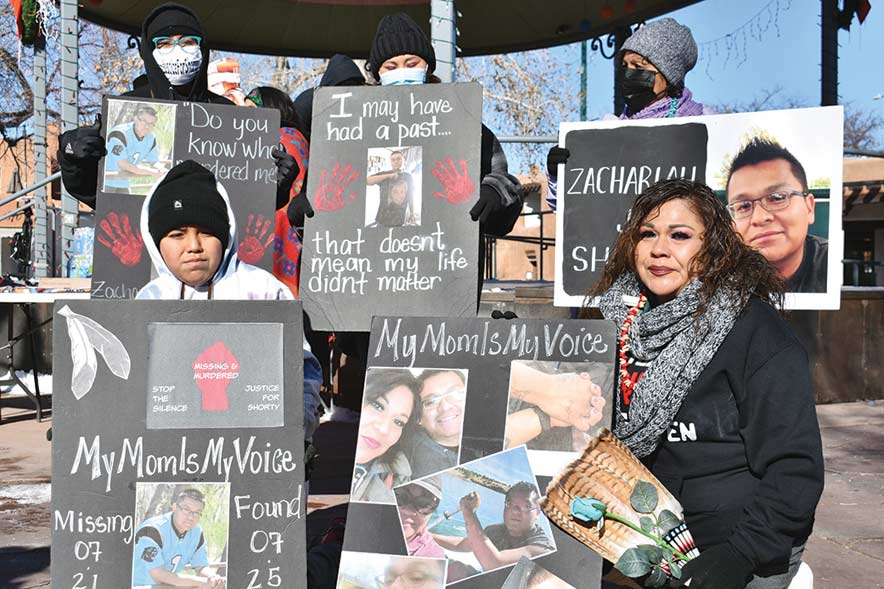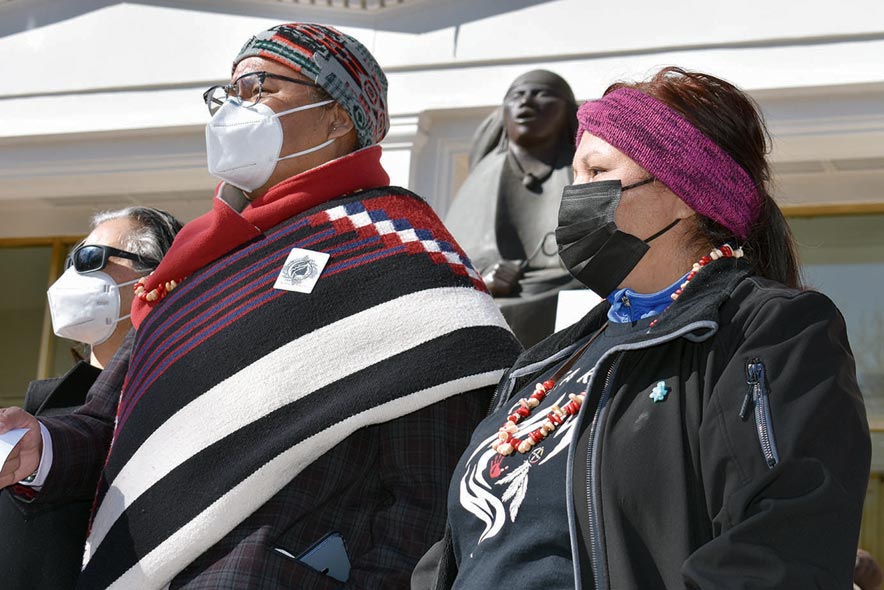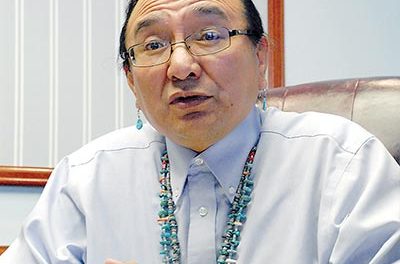
Historic missing, murdered bills bring new accountability, resources

Navajo Times | Rima Krisst
Shelby Livingston, sister of missing Pepita Madalyn Redhair and Vangie Randall-Shorty, mother of Zachariah Shorty, and her family advocate for their missing and murdered children on the Santa Fe Plaza on Indian Day on Feb. 4.
SANTA FE
The last week of the New Mexico’s 30-day legislative session proved to be a watershed moment for the advancement of policies and resources for the missing and murdered and their families in New Mexico.
The New Mexico House of Representatives unanimously approved Senate Bill 13 on Valentine’s Day, which establishes an annual “Missing in New Mexico” event and clearinghouse within the Department of Public Safety that will streamline missing person information and promote collaboration between state, tribal and federal law enforcement agencies.
Separately, Senate Bill 12, passed unanimously by the House on Feb. 16, gives the attorney general authority to investigate and prosecute missing Indigenous persons cases and hire a “missing Indigenous person specialist” to coordinate with local, state, federal and tribal law enforcement agencies.
“Today represents an important milestone,” Sen. Shannon Pinto, D-McKinley-San Juan, sponsor of the bills, told Navajo Times.
“Senate bills 12 and 13 will help unite communities in providing better access to the resources needed to help solve these crimes and bring justice to families,” she said.
SB12 also funds a grant program with an initial $1 million to create an information sharing network for New Mexico’s tribes and pueblos to help identify, report and find missing community members.
“The MMIWR event, coupled with the legislation in conjunction with the attorney general’s office, brings both attention and the action we need to address this terrible crisis,” said Pinto.
The passage of the bills came less than two weeks after Pinto and other Navajo Nation leaders joined the Missing and Murdered Indigenous Women and Relatives rally and march to the Capitol on Feb. 4.
Now SB13, sponsored by Pinto, Sen. Linda Lopez, D-Bernalillo, and Rep. Andrea Romero, D-Santa Fe, and SB12, sponsored by Pinto, Lopez and Rep. Pamelya Herndon, D-Bernalillo, await signature by Gov. Michelle Lujan Grisham, which is expected to happen.
MMIWR advocate Pamela Foster said as a mother of missing children, she knows the pain and injustice that can be felt and the unbearable anguish that comes with unanswered questions.
“There’s a great sense of relief knowing we will have the resources available for victims and their families,” said Foster, mother of Ashlynne Mike, who was abducted and murdered in Shiprock in 2016.
“When the voices of our Indigenous relatives have been silenced,” she said, “prayers aren’t enough – we need our leaders to take action.”
Foster told Navajo Times it is only through years of tireless grassroots activism and advocacy that these laws are being passed now.
“I know many families have waited for years and decades for answers and hope they can get the closure they need,” she said.
Rates highest in NM

Navajo Times | Rima Krisst
At the Feb. 4 rally at the New Mexico state capitol building on Indian Day, Delegate Nathanial Brown joins Shelby Livingston, sister of Pepita Madalyn Redhair, who went missing in Albuquerque in March of 2020 and has never been found.
A press release from the New Mexico Indian Affairs Department stated that SB13’s Missing in New Mexico event will bring together multiple partners across all levels of government to assist and serve families and victims in the pursuit of justice and case resolution.
“This legislation fosters dialogue and a commitment to address and prevent further tragedy in our community,” said DPS Cabinet Secretary Jason Bowie. “These women and families are members of our community, and everyone deserves to have our full support.”
According to the department, New Mexico currently has 926 active missing persons cases and 20 unidentified missing persons reported with the National Crime Information Center.
“With the highest number of open missing and murdered indigenous women cases in the country, it is essential that New Mexico does more to provide support to Native families in solving cases of missing loved ones,” said Lujan Grisham.
“This will not be solely a day of reflection or to remember the ones lost – this is a day of action where we will partner with federal and tribal law enforcement, members of the media, and communities and families to get justice for the loved ones of the missing,” said Lujan Grisham.
Rebecca Touchin, vice president of the Laguna Federation of Democratic Women, said SB13 will allow families to personally report their missing loved ones.
“It will be an event created specifically for those families suffering, where families can find a peace of mind, where families can feel comfortable sharing information and gathering information,” said Touchin.
Navajo Nation Council Delegate Amber Kanazbah Crotty said families with missing or murdered relatives often feel isolated and are unsure of what steps to take to find their loved ones and seek justice.
The Missing in New Mexico annual event will help bring concentrated resources together to help them and raise awareness, she said.
“We want it to be in a healing environment where law enforcement and other resources can come together,” she said. “Hopefully, by then, we’ll have a tribal, state and federal database.”
She said in addition to government and law enforcement entities, many nonprofits are also wanting to participate with services such as search and rescue programs and advanced search technologies.
‘No longer silent’
Crotty said SB12 will also help Native American families navigate the complexities of law enforcement jurisdiction and prevent cases from falling through the cracks.
“We need more education for law enforcement, our attorneys and everyone across the state,” said Crotty. “Because sometimes that’s really the only way we’re going to be able to do that prevention work. We want to build up the best practices and understand the community dynamics.”
McKinley County Commissioner Genevieve Jackson said the state of New Mexico owes their citizens equal protection.
“We will no longer be silent,” said Jackson. “Justice for the Native Americans has never been adequately addressed.
“These bills would only address a part of the atrocities that Native people have had to endure for many generations,” said Jackson. “We want these murders solved and the perpetrators brought to justice.”
Delegate Nathanial Brown told the Navajo Times there also needs to be a movement among Navajo men to step up and address the MMIWR issues as well as encourage a resurgence of boys’ coming-of-age ceremonies.
“As men, let’s continue to seek therapy and counseling and/or follow our own Navajo medicine men,” he said. “We, as Navajo men, need to deal with our shame from the abuse that ruins us. We have to get over our traumas and be the protectors again.”
Delegate Carl Slater said that to date all levels of government have failed to appropriately support victims and their families.
“Passage and enactment of SB12 and SB13 will be a strong step toward addressing the MMIWR crisis and tackling the many reasons for its persistence in our communities,” said Slater.
“I want to demonstrate that Diné and Native men support our grassroots women leaders in creating space to have these difficult discussions and creating positive action,” he said.







 Highway 264,
Highway 264, I-40, WB @ Winslow
I-40, WB @ Winslow